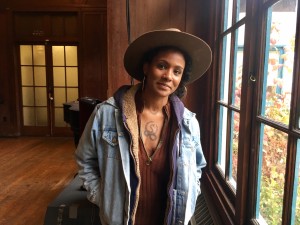
organization Lead for Life that combats gun violence and police brutality.
The words of multimedia artist Brontë Velez resonate throughout the room as everyone started to control their breathing and center themselves.
“Let’s just ground together to be here. If you want to find something that you’re feeling super grateful for today, I’m just going to say a little bit of the prayer that we open our work with at Lead to Life,” Velez said.
Velez, who uses they/them pronouns, has the audience encircled around them, chairs positioned in a circle that invites familiarity and community to their talk.
“We honor the ancestors and the original stewards of this land, the Ohlone people, and we ask for their permission in the lands before all else to carry out work out in peace, for peace,” they said. “May we learn from the mushrooms, what it means to carry death into new life, may we decompose violence in ourselves before we ask it of the world.”
Thus began Velez’s enthralling hour-long talk in the Student Union, a conversation which covers their multifaceted activism and passion for community healing, environmental and racial justice and the land that holds a history of trauma to many.
Velez is the co-founder of Lead for Life, an organization and project that melts guns into shovels as a meaningful statement about gun violence and police terror in the U.S., which was the one of the focal points of their talk; they are also the educator and media designer for local organization Planting Justice.
Velez lost their friend, X’avier Arnold, to gun violence in 2013. The perpetrator of Arnold’s death was a fourteen year old who is now serving three life sentences in prison. Velez understands the importance of situating children in their work, adding, “Black children aren’t afforded the opportunity for their trauma to be witnessed.” Their work with Planting Justice involves going to schools around Oakland and finding ways of reconciling deep personal, historical and intergenerational trauma by engaging with and educating local youth. They facilitate healing through the earth via gardening and allow them to recognize and validate their grief through events such as ceremonies with grief counselors.
Over the course of the hour, they share the scope of their work and the inspiration they have found within alchemy, ecology, art and activism. They show the film “Serotony” to the audience, which details the process and event of Lead to Life in Atlanta in commemoration of the fiftieth anniversary of Dr. Martin Luther King Jr.’s death by gun violence.
In the process, guns are put into a furnace by loved ones of those who have fallen to gun violence and into the molds of shovels. The newly created shovels are used to plant trees at historically significant sites of violence, and in some cases parents add the ashes of victims of gun violence to mix in with the earth and continue the healing through the cycle of life and death.
Lead for Life co-founder Kyle Lemle said in a Mercury News interview, “we’re liberating the metal in the weapon from its history of violence—and giving it a new life.”
Velez describes the process of planting tress all over Georgia at sites of violence and the subversive ways they had to enact resistance against police brutality on a widespread scale in the South.
“I couldn’t have gotten the support and resources we got if I said I was in resistance work,” they said, highlighting the perceived political neutrality of honoring Dr. King as a way of finding support from others. “People who were so unlikely to help us in the South were supporting us.”
Velez mentions Dr. Shawn Ginwright as a source of inspiration. Dr. Ginwright’s work, they said, transitioned the idea of post-traumatic stress to persistent traumatic stress environments that are repeatedly impacted by trauma from police brutality to environmental racism and lack of access to health and wellness.
The seeds of Lead to Life were planted with Velez’s undergraduate thesis, where they created a plantable book with seeds on every page. They wrote a fictional narrative blending historical fiction and futurism, trying to recuperate the lineage of Black and brown people’s impact on the agricultural system in the U.S. In their work, they questioned how to honor the trauma of the land the South has experienced from slavery.
Mills Community Farm manager Julia Dashe asked Velez to speak because of their multidisciplinary work within their community, connecting restorative justice, gun violence, racism, economic disparity, environmental justice, gardening and “making places beautiful with plants.”
“I really love that they’re an artist and an activist,” she said. “I really like that they’re interested in dealing with really hard issues in poetic ways.”
At the end of the talk, Velez mentions their upcoming events in Oakland and poses a question about future goals in collaboration with Oakland’s Anti-Police Terror Project (APTP) and Indigenous women-led community organization Sogorea Te’ Land Trust.
“How do we walk toward that moment that we’re calling in for Oakland, a moment where we know how to protect one another, where we don’t need to rely on the police, where the police are receiving therapy and healing and meditation for the trauma they’re also in,” Velez asked. “How do we call in that vision?”
